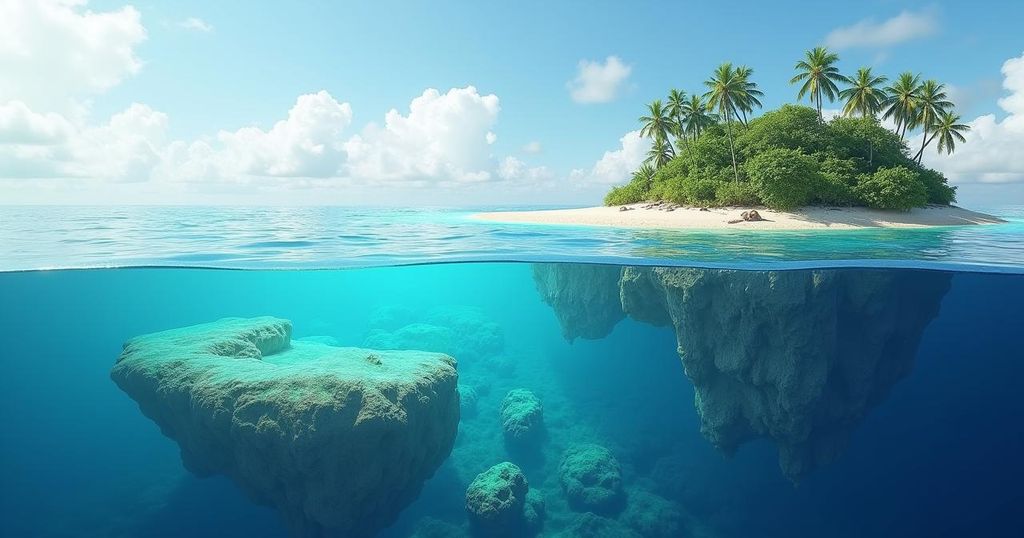U.N. Secretary-General Antonio Guterres has issued a stark warning regarding the rapidly rising sea levels, which greatly threaten Pacific island nations. Reports from the U.N. and World Meteorological Organization reveal alarming increases in sea levels, exacerbated by climate change, leading to increased flooding and other detrimental environmental impacts in these vulnerable regions. Guterres urges the international community, particularly richer nations, to take immediate action in reducing emissions and supporting affected areas as discussions at the upcoming U.N. General Assembly approach.
In a compelling appeal to the world, United Nations Secretary-General Antonio Guterres emphasized the unprecedented crisis of rising sea levels, particularly impacting Pacific island nations. He articulated a dire warning amidst reports from the United Nations and the World Meteorological Organization detailing the acceleration of sea level rise largely driven by climate change, thaws of ice sheets, and glaciers. Guterres highlighted the dual dangers faced by these nations, which include not only rising seas but also the subsequent threats of ocean acidification and marine heatwaves. \n\nDuring his visit to Samoa and Tonga, Guterres voiced his concerns at the Pacific Islands Forum, which convenes countries severely threatened by climate phenomena. He described the situation as “crazy,” stating that the rising seas represent a crisis created entirely by human actions. Recent findings indicate significant increases in sea levels near Tonga, Apia, and Suva-B, with rises recorded at 21 centimeters (8.3 inches), 31 centimeters (1 foot), and 29 centimeters (11.4 inches) respectively from 1990 to 2020, thereby endangering around 90% of the region’s residents, who live within three miles of the coast.\n\nThe report accentuated alarming trends in coastal flooding; for instance, Guam has seen a rise from two to 22 flooding occurrences annually since 1980. Similarly, American Samoa’s Pago Pago experienced a dramatic rise from no occurrences to 102 annually. The worsening situation calls for immediate action as the majority of Pacific Islands are at low elevations, exposing their populations to hazardous conditions. \n\nGuterres acknowledged changes since his last visit in 2019, coinciding with activism from local youth advocating for climate justice. He underscored the forced displacement faced by communities due to climate change—highlighting Itinterunga Rae’s narrative of the Barnaban people, who relocated from Kiribati to Fiji. Rae expressed the gravity of the situation, advocating for climate mobility while lamenting that abandoning communities is not a viable solution. \n\nExpressing urgency, retired sea level scientist S. Jeffress Williams affirmed the alarming rates of sea level rise. Noting that the Pacific region contributes minimally to heat-trapping gas emissions, Guterres called for accountability from wealthier nations to mitigate their carbon footprints and assist nations that are disproportionately affected and vulnerable to climate ramifications. \n\nThe report outlines the acceleration of global sea levels, currently rising at their most rapid pace in 3,000 years. The rate of increase has intensified from a mere 1.3 centimeters per decade between 1901 and 1971 to an alarming 4.8 centimeters (1.9 inches) per decade in the last ten years. Key cities in wealthier nations are similarly at risk, with rising sea levels affecting prominent cities like New Orleans and Miami, which have seen rises significantly surpassing the global average. \n\nGuterres’ statements aim to galvanize the international community as discussions regarding the implications of rising seas are poised to take center stage at the upcoming United Nations General Assembly. He urged Pacific Island nations to raise their voices against the actions of those contributing to climate change, asserting that their meager contributions afford them moral authority in calling for a reversal of the ongoing crisis.
The phenomenon of rising sea levels has emerged as a critical issue, particularly for Pacific island nations that face unique vulnerabilities due to their geography and climate impacts. The scientific consensus attributes rising sea levels primarily to climate change, which is driven by human-induced factors such as greenhouse gas emissions. This crisis manifests through the melting of ice caps and glaciers, the thermal expansion of seawater, and other climatic changes that threaten low-lying coastal areas worldwide. The Pacific Islands Forum convenes nations that are on the frontline of these climate impacts, prompting discussions and advocacy for urgent action and global accountability.
In summary, the risk posed by rising sea levels to Pacific island nations cannot be overstated, with U.N. Secretary-General Antonio Guterres highlighting the crisis as fundamentally human-made. Recent reports illustrate alarming data, indicating that the Pacific region suffers disproportionately from these changes, with significant changes in flooding patterns and sea-level increases. Guterres calls for urgent action from both wealthier nations and global leaders to mitigate climate change and support those most affected. The continued advocacy and engagement by Pacific Island nations exemplify the need for urgent collective action and responsibility in addressing the climate crisis.
Original Source: www.voanews.com






